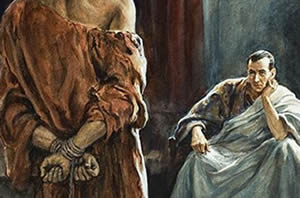Misconception #36
Jesus Never Answered Pilate’s Question: “What is Truth?”
As the story goes: The prisoner stood, head hanging in quiet submission, as Pontius Pilate, the Roman governor, grilled him about his role in the most recent Judean uprising. Rumor had it that the man before him was not only trying to usurp the throne of Herod Antipas, but he was also trying to stir up an insurrection amongst the Jewish zealots under his jurisdiction.
But as far as Pilate was concerned, this vagabond—what was his name again, Jesus of Nazareth?—was interfering with the one thing that mattered most to him, the only thing. So, as the governor prodded his prisoner, he was far less concerned with the religious implications of the rumors swirling about the city. His primary concern was with the civil order that Tiberius Caesar himself had commissioned him to uphold.
A brutal mercenary, Pilate had already quelled several religious skirmishes in his territory; and this one would prove to be no different from the rest. It would be crushed at all cost, if not for the sake of Rome, then certainly for the sake of his own career. No time for chit-chat, Pilate came right out and asked Jesus the most important question on his mind: “Are you really the king of the Jews?”
But Jesus understood what He was up against. He knew Pilate was nothing more than a cutthroat politician; and the last thing He was going to do was to engage him on his level. Pilate may have been skilled at this sort of thing, but Jesus was even better prepared to extinguish his kind of fiery temperament. Looking up at His interrogator, Jesus calmly replied, “Who wants to know? Are you asking for yourself? Or have others told you about Me?”
“Who me?” blurted Pilate. “What—you think I’m a Jew?” Fiercely eyeing his quarry, the malignant governor tried to stay on top of the situation. Far be it for this nobody from a backwash like Nazareth to get the best of him. “Your own people delivered you into my hands. The priests accuse you of crimes against the state. What have you done, anyway?”
Story Continues Below
Says Richard Price—the founder and CEO of Academia.edu—on his podcast In Depth With Academia:
Fish Tales (From the Belly of the Whale): Fifty of the Greatest Misconceptions Ever Blamed on The Bible is:
To hear Price’s book review of Fish Tales (From the Belly of the Whale), CLICK HERE.
To hear Kent and Zen Garcia talk about correcting biblical misconceptions, from September 9th, 2021, CLICK BELOW.
Story Continues From Above
Still, Jesus remained unruffled. “My Kingdom is not of this world,” He said, staring back at Pilate, with eyes that eerily bored into the irate governor. “If it were, My servants would be fighting for Me even as we speak, and the Jewish authorities would never have been able to hand Me over to you. But as it is, My Kingdom is not of this place.”
The fire in Pilate’s eyes suddenly dimmed; but as to why, he couldn’t say. Was it the serene calmness of his prisoner, even as he belligerently stared him down? Or was it something altogether different? He tried his best to conceal his confusion. “Then you are a king,” he sputtered through clinched teeth. “Tell me now. Are you? Or aren’t you?”
As gently as a summer breeze, Jesus smiled back at his captor, as if they’d been friends all their lives. “There, you see: You said it yourself. Even as you speak it, you know it’s true. You say I’m a king, because that’s the sole reason for which I was born.
I came into this world to bear witness to the truth, and everyone who is of the truth hears My voice.”
Then, just as gently, Pilate responded, defeated, worn down by his prisoner’s solemn countenance. “Truth? Tell me, then. What is truth?”It’s then that the canonical account of Scripture tells us Jesus fell strangely silent, offering no reply to the governor’s question.
“Why won’t you answer me?” asked Pilate.
For several agonizing moments, Jesus just stared back at His interrogator without even blinking.
Pilate clenched his fist, as much in frustration as in anger. “Are you just going to stand there? Don’t you know I have the power to release you or have you crucified?”
“But don’t you see?” Jesus finally said. “You only have power over Me because it’s been given to you from above; therefore the one who handed Me over to you is guilty of an even greater sin.”
Shaking his head, the bewildered governor wiped his weary brow and exhaled loudly. He turned suddenly on his heels, exited the room, and stepped into the hallway, where he stood face to face with a group of black-robed Jewish leaders. “It’s sheer madness, I tell you,” Pilate growled. “I’ve never seen anything like it. This man has done nothing that warrants a charge of guilt, and yet—”
“I beg your pardon, Governor,” snapped Caiaphas, the high priest at Jerusalem. “You couldn’t be more wrong. This man is a subversive of the highest order; he has the entire city in an uproar. Have you forgotten what happened the last time these people you’re supposed to govern started a riot? If it happens again, sir, and Caesar finds out you stood by and did nothing to prevent it, I guarantee you’ll suffer the consequences!”
Pilate’s eyes thinned and he inhaled slowly, simmering with resentment at the mere thought. The only thing he hated more than having to corral this bunch of zealous Jews was having the leader of these zealots best him in a contest of wills. So, as much as he hated to agree with Caiaphas’ appraisal of the situation, Pilate did agree that something had to be done to dispel the people before another riot ensued. As a minion of Rome, Pilate had one duty above all others: To maintain the civil order of his territory … no matter the cost. His only choice, then, was to hand Jesus over to the angry mob, who executed Him, much to the chagrin of even a cutthroat politician like Pontius Pilate.1
So goes the story, as they say, right?
Okay, so what happened here?








